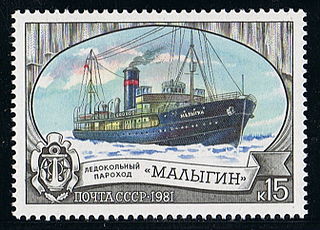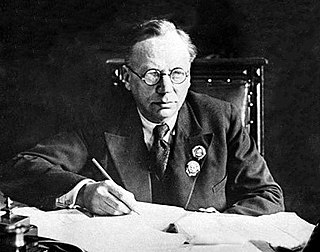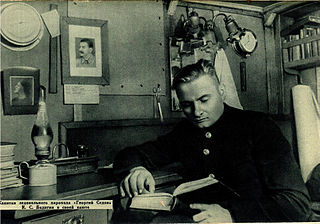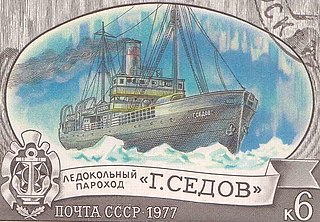Sadko may refer to one of the following icebreakers named after Sadko, a hero of a Russian bylina :
- Sadko (1913), a Russian and later Soviet icebreaker that sank in 1941
- Sadko (1968), a Soviet and later Russian Navy armed patrol icebreaker
Sadko may refer to one of the following icebreakers named after Sadko, a hero of a Russian bylina :
Sadko is a Russian mythical hero.

Sadko was a Russian and Soviet icebreaker ship of 3,800 tonnes displacement. She was named after Sadko, a hero of a Russian bylina.

The steamship Malygin (Малыгин) was a Soviet icebreaker of 3,200 tonnes displacement. She was named after Stepan Malygin.

Georgy Alexeyevich Ushakov was a Soviet explorer of the Arctic.

Vladimir Yulyevich Wiese was a Russian scientist of German descent who devoted his life to the study of the Arctic ice pack. His name is associated with the Scientific Prediction of Ice Conditions theory. Wiese was a member of the Soviet Arctic Institute and an authority on polar oceanography. He was also the founder of the Geographico-hydrological School of Oceanography.

Captain Konstantin Sergeyevich Badygin was a Soviet naval officer, explorer, author, and scientist.

The Georgiy Sedov was a Soviet ice-breaker fitted with steam engines. She was originally the Newfoundland seal fishery support vessel Beothic and was renamed after Russian captain and polar explorer Georgy Yakovlevich Sedov in 1915.

Rudolf (Ruvim) Lazarevich Samoylovich was a Soviet polar explorer, professor, and doctor of geographic sciences.
There have been several icebreakers known as Semyon Dezhnev.
Moskva class may refer to:
Malygin (Малыгин) may refer to one of the following icebreakers:
Fyodor Litke may refer to one of the following icebreakers named after Friedrich Benjamin von Lütke :
Ural may refer to the following vessels:
Three icebreaking ships have been named Sibir:
Moskva is the name of several ships. They are named for the transliteration of Russian: Москва, lit. 'Moscow'.
Ilya Muromets may refer to one of the following icebreakers named after the Russian folk hero:
Three icebreakers have been named Georgiy Sedov:

Project 97 icebreakers and their derivatives are a diverse series of diesel-electric icebreakers and other icebreaking vessels built in the Soviet Union. In total, 32 vessels were built in various configurations for both civilian and naval service in the 1960s, 1970s and early 1980s, and several remain in service in Russia as of 2023.
Kiev is the name of several ships:
Purga may refer to one of the following icebreakers: